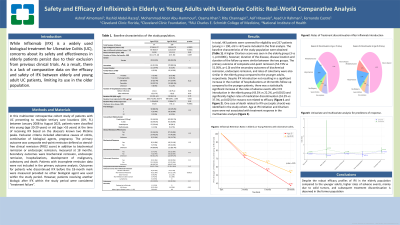Tuesday Poster Session
Category: IBD
P4348 - Safety and Efficacy of Infliximab in Elderly vs Young Adults With Ulcerative Colitis: Real-World Comparative Analysis
Tuesday, October 29, 2024
10:30 AM - 4:00 PM ET
Location: Exhibit Hall E

Has Audio

Ashraf Momani, MD
Cleveland Clinic Florida
Weston, FL
Presenting Author(s)
Ashraf Almomani, MD1, Rashid Abdel-Razeq, MD2, Mohamad-Noor Abu-Hammour, MD3, Osama Sherjeel Khan, MD1, Ritu NA. Channagiri, BS1, Prabhat NA. Kumar, MD4, Asif Hitawala, MD5, Fernando NA. Castro, MD1, Asad Ur Rahman, MD1
1Cleveland Clinic Florida, Weston, FL; 2Cleveland Clinic, Cleveland, OH; 3Cleveland Clinic Fairview, Cleveland, OH; 4Cleveland Clinic Florida, Weston, OH; 5University of Maryland, Bethesda, MD
Introduction: While Infliximab (IFX) is a widely used biological treatment for Ulcerative Colitis (UC), its use in elderly patients has been limited, not only due to the concerns regarding its safety and effectiveness in this population with higher comorbidities (compared to younger adults), but also due to the exclusion of this population from clinical trials.
Methods: In this multicenter retrospective cohort study of UC patients presenting to tertiary care locations (OH, FL) between January 2008 to August 2023, patients were classified into young (20-29 years) or old ( >55 years) at the time of receiving IFX. Exclusion criteria included alternative causes of colitis, biologics combination or pregnancy. The primary outcome was composite end-point remission defined as steroid-free clinical remission (PRO2 score) in addition to biochemical remission or endoscopic remission, measured at 18 months. Secondary outcomes were biochemical remission, endoscopic remission, hospitalizations, malignancy, colectomy and death. Patients with incomplete remission data were not included in the primary outcome analysis. Outcomes for patients who discontinued IFX before the 18-month mark were measured provided no other biological agent was later used. Treatment change was considered “treatment failure”
Results: 443 patients were screened and 257 (190 young, 67 old) were included in the final analysis (Table 1). Higher Charlson score was seen in the older group (3 vs 1, p< 0.0001) with similar baseline disease severity, duration and phenotype. The primary outcome of composite remission (53.73% vs 51.05%) and the secondary outcomes of biochemical remission (7.5% vs 15.8%), endoscopic remission (11.9% vs 20.0%) and rates of colectomy (29.9% vs 30.5%) were also similar in the elderly group compared to the younger adults, respectively. Despite IFX introduction not resulting in a significant increase in the number of hospitalizations (1 vs 1, p=0.53), higher rate of adverse events in the elderly group and treatment discontinuation for reasons not related to efficacy was observed (Figure 1.1 and 1.2). One case of death related to IFX (septic shock) was identified. Age at IFX and Charlson score were not associated with treatment response in the multivariate analysis (Figure 1.3)
Discussion: Despite the robust efficacy profiles of IFX in the elderly population compared to the younger adults, higher rates of adverse events, mainly due to solid tumors, and subsequent treatment discontinuation is observed in the former population.

Note: The table for this abstract can be viewed in the ePoster Gallery section of the ACG 2024 ePoster Site or in The American Journal of Gastroenterology's abstract supplement issue, both of which will be available starting October 27, 2024.
Disclosures:
Ashraf Almomani, MD1, Rashid Abdel-Razeq, MD2, Mohamad-Noor Abu-Hammour, MD3, Osama Sherjeel Khan, MD1, Ritu NA. Channagiri, BS1, Prabhat NA. Kumar, MD4, Asif Hitawala, MD5, Fernando NA. Castro, MD1, Asad Ur Rahman, MD1. P4348 - Safety and Efficacy of Infliximab in Elderly vs Young Adults With Ulcerative Colitis: Real-World Comparative Analysis, ACG 2024 Annual Scientific Meeting Abstracts. Philadelphia, PA: American College of Gastroenterology.
1Cleveland Clinic Florida, Weston, FL; 2Cleveland Clinic, Cleveland, OH; 3Cleveland Clinic Fairview, Cleveland, OH; 4Cleveland Clinic Florida, Weston, OH; 5University of Maryland, Bethesda, MD
Introduction: While Infliximab (IFX) is a widely used biological treatment for Ulcerative Colitis (UC), its use in elderly patients has been limited, not only due to the concerns regarding its safety and effectiveness in this population with higher comorbidities (compared to younger adults), but also due to the exclusion of this population from clinical trials.
Methods: In this multicenter retrospective cohort study of UC patients presenting to tertiary care locations (OH, FL) between January 2008 to August 2023, patients were classified into young (20-29 years) or old ( >55 years) at the time of receiving IFX. Exclusion criteria included alternative causes of colitis, biologics combination or pregnancy. The primary outcome was composite end-point remission defined as steroid-free clinical remission (PRO2 score) in addition to biochemical remission or endoscopic remission, measured at 18 months. Secondary outcomes were biochemical remission, endoscopic remission, hospitalizations, malignancy, colectomy and death. Patients with incomplete remission data were not included in the primary outcome analysis. Outcomes for patients who discontinued IFX before the 18-month mark were measured provided no other biological agent was later used. Treatment change was considered “treatment failure”
Results: 443 patients were screened and 257 (190 young, 67 old) were included in the final analysis (Table 1). Higher Charlson score was seen in the older group (3 vs 1, p< 0.0001) with similar baseline disease severity, duration and phenotype. The primary outcome of composite remission (53.73% vs 51.05%) and the secondary outcomes of biochemical remission (7.5% vs 15.8%), endoscopic remission (11.9% vs 20.0%) and rates of colectomy (29.9% vs 30.5%) were also similar in the elderly group compared to the younger adults, respectively. Despite IFX introduction not resulting in a significant increase in the number of hospitalizations (1 vs 1, p=0.53), higher rate of adverse events in the elderly group and treatment discontinuation for reasons not related to efficacy was observed (Figure 1.1 and 1.2). One case of death related to IFX (septic shock) was identified. Age at IFX and Charlson score were not associated with treatment response in the multivariate analysis (Figure 1.3)
Discussion: Despite the robust efficacy profiles of IFX in the elderly population compared to the younger adults, higher rates of adverse events, mainly due to solid tumors, and subsequent treatment discontinuation is observed in the former population.

Figure: Figure 1.1: Infliximab Retention Rate over 18-month follow up. Figure 1.2: Reasons for Infliximab Discontinuation in the Study Population. Figure 1.3: Univariate and Multivariate Analysis for Predictors of Remission among Patients with Ulcerative Colitis on Infliximab.
Note: The table for this abstract can be viewed in the ePoster Gallery section of the ACG 2024 ePoster Site or in The American Journal of Gastroenterology's abstract supplement issue, both of which will be available starting October 27, 2024.
Disclosures:
Ashraf Almomani indicated no relevant financial relationships.
Rashid Abdel-Razeq indicated no relevant financial relationships.
Mohamad-Noor Abu-Hammour indicated no relevant financial relationships.
Osama Sherjeel Khan indicated no relevant financial relationships.
Ritu Channagiri indicated no relevant financial relationships.
Prabhat Kumar indicated no relevant financial relationships.
Asif Hitawala indicated no relevant financial relationships.
Fernando Castro indicated no relevant financial relationships.
Asad Ur Rahman indicated no relevant financial relationships.
Ashraf Almomani, MD1, Rashid Abdel-Razeq, MD2, Mohamad-Noor Abu-Hammour, MD3, Osama Sherjeel Khan, MD1, Ritu NA. Channagiri, BS1, Prabhat NA. Kumar, MD4, Asif Hitawala, MD5, Fernando NA. Castro, MD1, Asad Ur Rahman, MD1. P4348 - Safety and Efficacy of Infliximab in Elderly vs Young Adults With Ulcerative Colitis: Real-World Comparative Analysis, ACG 2024 Annual Scientific Meeting Abstracts. Philadelphia, PA: American College of Gastroenterology.
